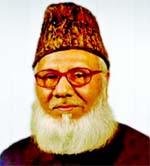
Staff Reporter : The Appellate Division of the Supreme Court (SC) on Thursday upheld death sentence for condemned war criminal and Jamaat-e-Islami Ameer Motiur Rahman Nizami for crimes against humanity during the Liberation War in 1971, rejecting his review petition.A four-member bench of the Appellate Division headed by Chief Justice Surendra Kumar Sinha pronounced the judgment around 11:30am. The three other members were Justice Nazmun Ara Sultana, Justice Mahmud Hossain and Justice Hasan Foez Siddique. The only course of action left for the war criminal Nizami is to submit a mercy petition for his life to the president. Nizami, Chief of the Jamaat party that opposed Bangladesh’s liberation during 1971, was previously convicted of five war crimes charges, including murder of intellectuals. As soon as the news spread, people from all walks of life and different socio-political organisations expressed their satisfaction and joy over the verdict. Besides, many people brought out processions, distributed sweets across the country. They demanded immediate execution of the Apex Court judgment.Gonojagoron Mancha, a platform that has been marching for the capital punishment of all war criminals, brought out a celebration rally at Shahbagh after the verdict.Freedom fighter Zahir Uddin Jalal, also known as Bichchu Jalal, said, “It has been proved through today’s (Thursday) verdict that Nizami is a rapist, killer and an agent of Pakistan.”Attorney General Mahbubey Alam in his instant reaction expressed his satisfaction over the verdict saying the copy of the full verdict of the review petition will now be sent to the prison authorities, who later would read it out to Nizami. “Nizami can file a mercy petition with President Md Abdul Hamid admitting the crimes,” he added.He also said the government will decide about Nizami’s execution. “His role behind the killings of intellectuals is known to all. Al-Badr cadres killed the ‘golden sons’ of our soil at his instigation, incitement and order,” said the Attorney General. Sanaul Haque, senior coordinator of the International Crimes Tribunal (ICT) investigation agency said he was the driving force behind the Razakar and Al-Badr. “He was behind many killings. The families of the victims will be satisfied now,” he added. Senior prosecutor Barrister Tureen Afroz termed the verdict as the victory for truth, while her colleague Zead-al Malum said this judgment has met the expectation of the justice-seekers and family members of the martyrs.Meanwhile, Khandaker Mahbub Hossain, chief counsel for the convicted war criminal, declined to make any statement about the verdict, saying the time will review the judgment.”Whether he (Nizami) will file clemency plea or not, is completely his decision,” said the senior lawyer.The International Crimes Tribunal (ICT)-1 on October 29, 2014 sentenced the former chief of Islami Chhatra Sangha (ICS), then student wing of Jamaat, who later was sworn in as the supreme commander of infamous Al-Badr, as it found him guilty in eight charges out of the total 16.On November 23, 2014, Nizami filed an appeal, seeking acquittal of the charges on 168 grounds.On January 6, a four-member bench of the Appellate Division, headed by Chief Justice Surendra Kumar Sinha, upheld the death sentence of the Jamaat Ameer. The Appellate Division upheld the ICT-1 order sentencing Nizami to death for the wartime crimes, including genocide and murder of intellectuals. The Apex Court after holding hearing on the matter upheld his death on three charges, including masterminding the killings of intellectuals at the fag end of War of Liberation, aimed at making the country brainless.The court also upheld death for the Badr leader for killings of around 450 people in villages Baushgari, Demra and Rupshi under Shathia upazila of Pabna on May 14, 1971. Around 30-40 women were violated by the Pakistani troops and Razakars on that day.Nizami was also sentenced to death for his pivotal role in killings of 52 people including children and women in village Dhulauri on November 27, 1971.The SC upheld his life term imprisonment for two charges, out of four in connection with the arrest, detention, torture, and murder of three people, including headmaster Maulana Kasim Uddin of Pabna Zila School on June 4, 1971, complicity in torture, murder and rape at Mohammadpur Physical Training Institute in Dhaka, and murder of Badi, Rumi Jewel and Azad at Old MP Hostel in Dhaka on August 30, 1971. The Appellate Division acquitted the Jamaat leader of two other charges. On October 29, 2014, the ICT-1 sentenced Nizami to death for committing crimes against humanity during the Liberation War. On March 29, 2016, the Jamaat leader filed a plea, seeking review of the Appellate Division judgment. The Apex Court concluded holding hearing on the matter on May 3 and set today for pronouncing verdict.Nizami was shown arrested under ICT act on August 2, 2010. On May 28, 2012, the ICT-1 indicted Nizami of 16 specific charges of crimes against humanity.Meanwhile, Jamaat-e-Islami called hartal on May 8 protesting the verdict of the Supreme Court.Earlier on March 15, the ICT issued a death warrant for Nizami for his crimes against humanity during the Liberation War in 1971 after the apex court released the full text of its verdict upholding his death penalty.1. Death upheld on 3 charges: His involvement in killing of 450 people at Bausgari and Demra in Pabna on May 14, 1971 and violation of 32 women by Pak troops and Razakars on the same day; murdering of three people at Dhulaura of the district; and for killing intellectuals.2. Life imprisonment upheld in 2 charges: For killing Sohrab Ali, and freedom fighters Rumi, Bodi, Jewel and Azad.3. Acquitted in 3 charges: Killing 11 and rape of 3 in Karmja, which he was originally given death sentence, and two others: torture and killing at Mohammadpur Physical Training Centre and killing of Kasim Uddin, in which he got life imprisonment for each.

